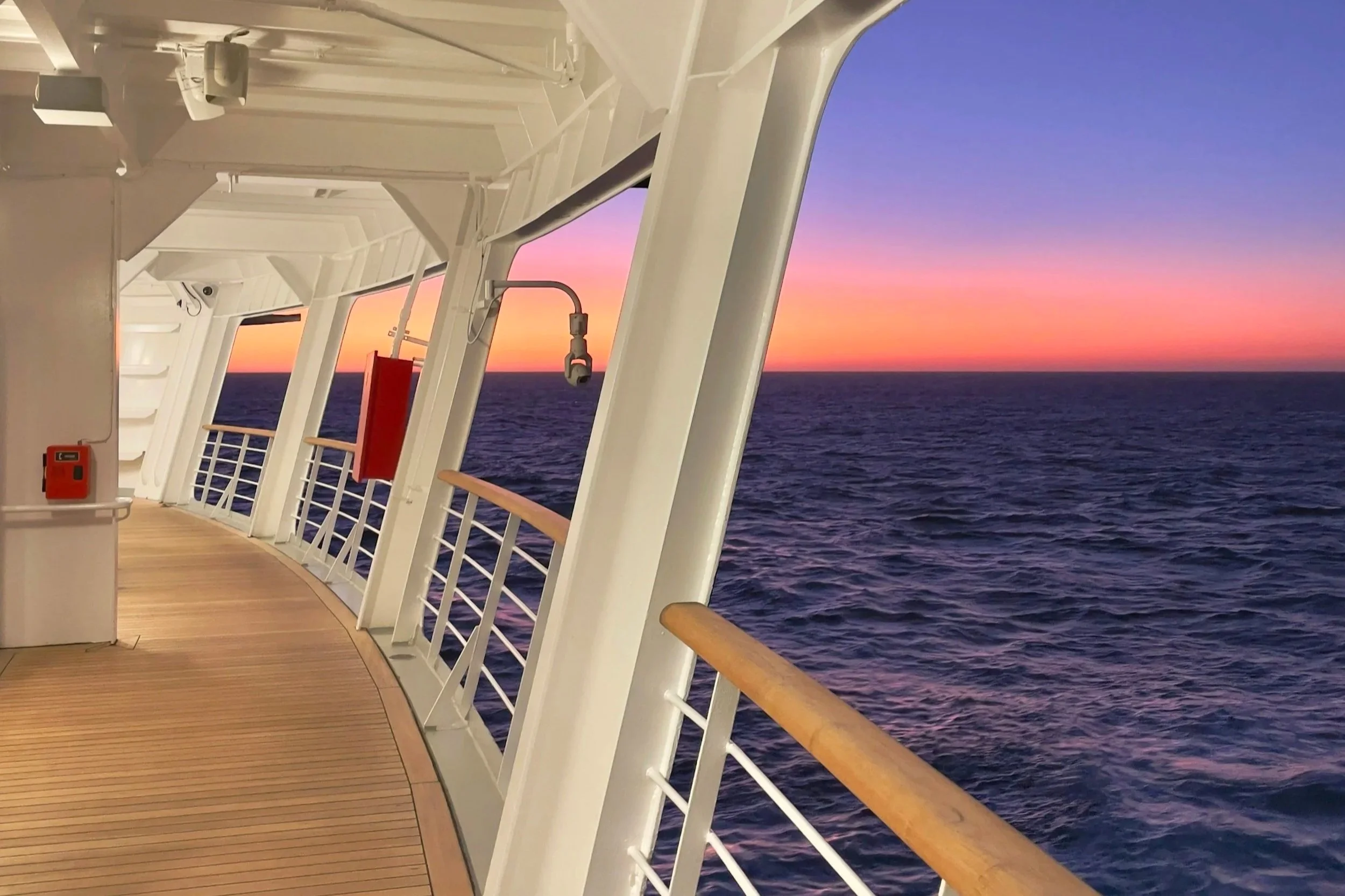How to Save Money While Working on a Cruise Ship
Since Covid, I’ve been thinking more seriously about how to save money from gradually cutting back on things I didn’t actually need.
When I came back to ship life after the lockdowns, something had shifted. I didn’t want to blow through my salary like before. I didn’t want to feel like I was working for free anymore.
So I stopped spending on the little things that used to feel automatic. Less wifi, fewer port snacks, more time just walking around instead of shopping. I didn’t have a strategy. I just did what made sense at the time.
Looking back now, it wasn’t about restriction. It was about being okay with not needing much – and realising that simplicity made it easier to save.
This isn’t a strict list of money-saving tips. It’s just what I did, what helped, and what changed for me along the way.
How I Save Money While Working on a Cruise Ship
1. Maximise free onboard meals and perks
I don’t travel to eat, and I’m not a foodie by nature, so it’s easy for me to skip meals ashore. Instead, I usually eat onboard before going out.
The food might not always be exciting, but it’s free. That alone saves quite a bit over time. If you’re someone who tends to snack out of boredom or buy treats in every port “just because,” this simple habit can help.
There are also other free perks – crew laundry allowance, gym access, library, and even basic toiletries – that can reduce how much you feel the need to spend.
2. Step away from the crew bar when bored
Crew bar nights can be fun, but the charges add up fast – especially when you're just hanging out to kill time. Everything gets billed through our crew card, which we always carry anyway since it doubles as a cabin key. That makes it easy to swipe without thinking.
I’ve learned to pay attention to why I’m there – am I actually enjoying myself, or just passing time? Sometimes I leave early, find a quiet spot, or retreat to cabin to read instead.
I still hang out with friends, but not every night has to come with a bar tab. Boredom doesn’t need to cost money.
3. Create small limits, not strict rules
I’ve never stuck to rigid budgets. What helped more was just giving myself gentle limits – like $30/week for all non-essentials. That includes port snacks, crew bar drinks, spontaneous shopping, and small comforts. If I go over, I notice it. But most weeks, I don’t.
4. Find free or affordable connectivity
Most port terminals have free wifi, and it’s usually fast enough to stream, download shows, or call home – which is why you’ll often see crew gathering there the moment we’re allowed off.
Onboard, some ships offer free wifi for messaging apps or even limited access during certain hours, though speeds vary.
I used to buy local SIM cards for longer port stays, but it’s become harder to register one as a foreigner. Now I use eSIMs instead. A small monthly data plan works fine for basic use, and I save heavier downloads for strong port wifi. It’s all about mixing and matching.
5. Choose low-cost or free ways to enjoy shore leave
Not every port needs to be a shopping spree or excursion day. Some of my favourite memories came from long walks, hikes, or just finding a quiet spot to sit and people-watch.
Taxis are expensive, and honestly, the best way to explore a new place is often on foot. Some ports also offer crew discounts on local tours, cafes, or services – you just have to ask.
Shore leave doesn’t have to mean spending. It’s a break from the ship, and that alone is valuable. Spending less means you can enjoy the time more freely, without buyer’s regret.
6. Avoid impulse spending onboard or in port
It’s easy to overspend when everything feels like a crew deal. Onboard retail shops often run monthly promotions on branded bags, perfumes, or watches, which many crew buy either as gifts or personal treats.
I’ve never been interested in luxury items, but I used to splurge on fast fashion from places like H&M during shore leave, or pick up overpriced souvenirs just for the sake of it. These days, I still collect fridge magnets when I visit new ports – but I buy them with more intention.
The same goes for local snacks. I’ll treat myself to something unique to the port, but I avoid turning every stop into a shopping spree.
7. Bring what you need, so you don’t have to rebuy it
It’s hard to find specific products onboard, and even in port, shopping eats into shore leave time. I try to bring what I know I’ll need – not just toiletries, but comfort snacks, specific clothes – anything that’s hard to replace.
My family helps me stock up on items we buy in bulk back home, which saves money and the stress of last-minute purchases.
To balance the luggage, I pack fewer clothes and reuse items more often. It’s not perfect, but it works. I might sound a little crazy for bringing everything from laundry soap to a specific brand of shampoo. I'd rather carry what I need than waste time and money tracking it down later.
8. Remind yourself why you want to save
Why are you saving money? For me, it’s about gaining the freedom to take longer breaks between contracts without the pressure to jump into another job right away. It’s easy to get caught in the constant cycle of cruise ship contracts, but reminding myself of why I want to break free from that pattern keeps me motivated.
Maybe your reason is to travel more, spend time with family, or simply have peace of mind. Whatever it is, write it down and keep it visible. When you know your "why", it becomes easier to say no to things that don’t matter.
In the end, saving money onboard doesn’t have to mean missing out. It just means spending with more intention.
If you want to dig deeper, here’s what I figured out about budgeting as cruise ship crew, or take a look at what typical cruise ship crew expenses actually look like.














